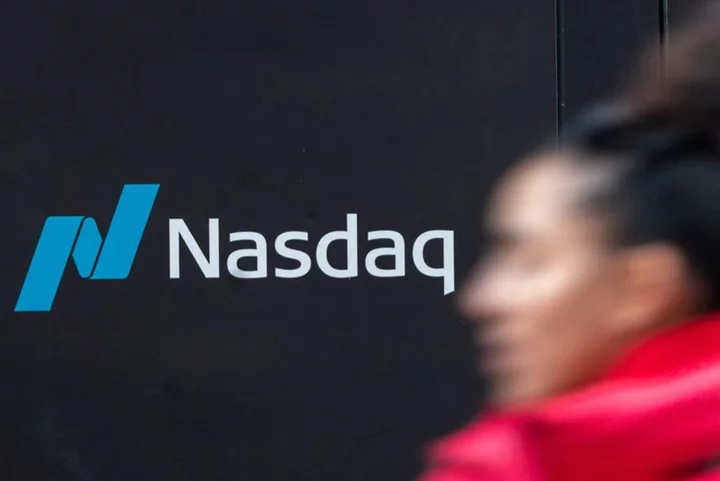By Sruthi Shankar and Medha Singh
A "special rebalance" of the Nasdaq 100 index will take place later this month as exchange operator Nasdaq looks to reduce the concentration of heavyweight companies that account for nearly half of the index's weight.
A blistering rally in growth and technology stocks has lifted the Nasdaq 100 index by 37.5% this year. That compares with a 14.8% gain for the benchmark S&P 500.
Microsoft, Apple, Nvidia, Amazon.com and Tesla combined account for 43.8% weight in the index, according to Refinitiv data as of Monday's close. As part of the rebalance that will come down to 38.5%.
"There is some concern that this handful of names is distorting the health of the overall stock market, which is likely what's spurring the special rebalancing," said Art Hogan, chief market strategist at B Riley Wealth.
The adjustment will be based on shares outstanding as of July 3, with changes set to be announced on July 14 and taking effect before the market opens on July 24.
WHAT IS A SPECIAL REBALANCING?
A special rebalancing, which is part of Nasdaq 100's methodology to maintain compliance with a U.S. Securities and Exchange Commission rule on fund diversification, has taken place twice before, in 2011 and 1998, said Cameron Lilja, global head of index product and operations at Nasdaq.
The special rebalancing may be conducted at any time if the aggregate weight of companies, each having more than 4.5% weight in the index, tops 48%, according to Nasdaq. During the rebalancing, it is capped at 40%.
Microsoft has the largest weight at 12.91%, followed by Apple at 12.47%, Nvidia 7.04%, Amazon 6.89% and Tesla 4.50%, according to Refinitiv data.
A recent rally in Tesla's shares pushed the aggregate weight above 48%, triggering the rebalance, Wells Fargo strategists said in a client note.
COULD THE S&P 500 FOLLOW SUIT?
Rebalancing of weights in the S&P 500 takes place when the aggregate of companies, with each having weight greater than 4.8%, exceeds 50% of the total index, according to S&P Dow Jones Indices.
Apple and Microsoft are the only two firms with weight over 4.5% in the S&P 500. The top five firms, with the most influence in the S&P 500 that also include Amazon, Nvidia and Tesla, make up for 22.2% of the index's total market value.
An S&P spokesperson said that they "do not typically comment on other index providers' actions and potential changes to our indices".
WHICH STOCKS COULD SEE A BUMP IN WEIGHT?
Wells Fargo index strategists estimate Starbucks, Mondelez, Booking Holdings, Gilead Sciences, Intuitive Surgical, Analog Devices and Automatic Data Processing will see their weight increase in the Nasdaq 100 index.
Meanwhile Microsoft, Apple, Nvidia, Amazon, Tesla, Meta Platforms and Alphabet's influence in the index could reduce, according to the strategists.
"The smaller companies will end up representing a greater percentage of the entire index," said Sam Stovall, chief investment strategist at CFRA Research.
"It will require portfolio managers to add to their positions in these companies, which will boost their share prices."
PUTTING BRAKES ON MEGACAP RALLY
Apple, which touched $3 trillion in market capitalization late last month, fell 1% on Monday following the news. Other megacap stocks including Microsoft, Alphabet and Amazon fell between 0.7% and 2.5%.
Changes to the index will force investment funds that track it to adjust their portfolios and sell shares of companies that have their weight in the index reduced.
A host of funds that track the Nasdaq 100, including popular exchange traded fund, the $200 billion Invesco QQQ ETF, are expected to be impacted by the rebalancing.
(Reporting by Sruthi Shankar, Medha Singh and Bansari Mayur Kamdar in Bengaluru; Additional reporting by David Randall in New York; Editing by Shounak Dasgupta)

